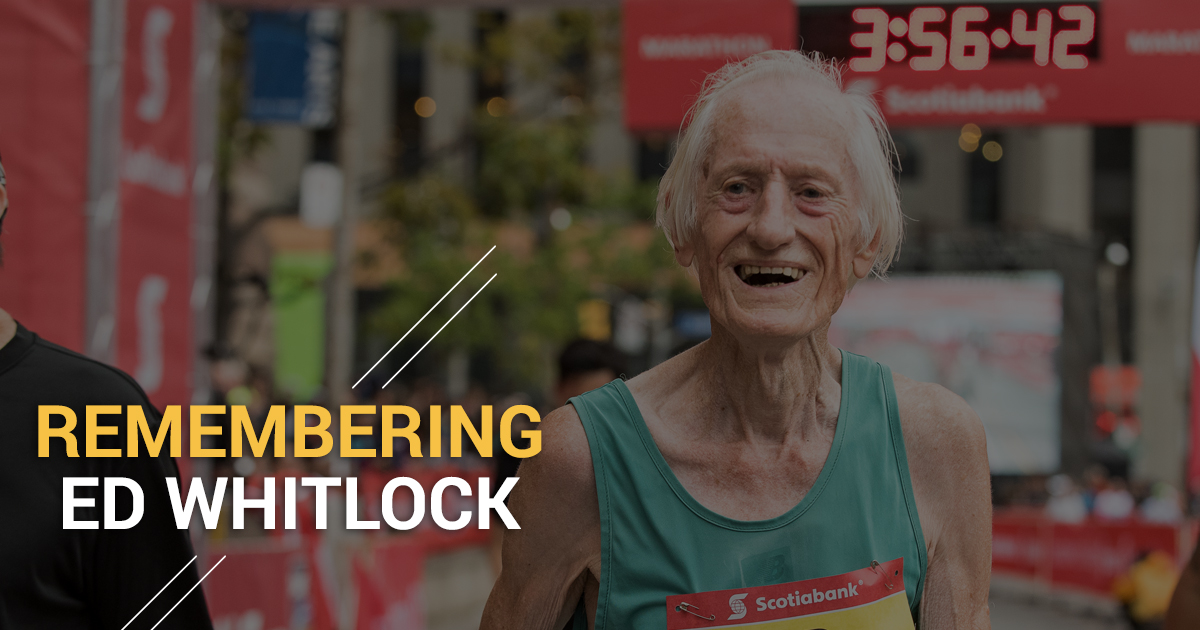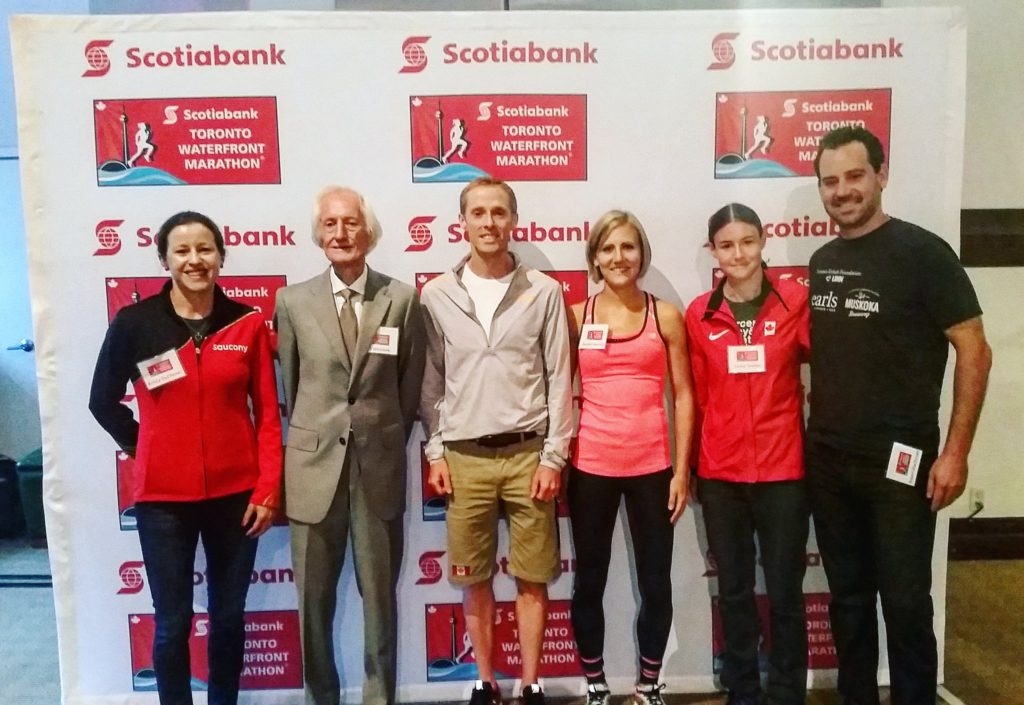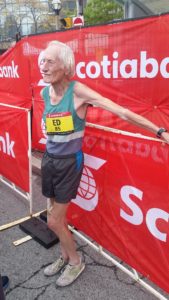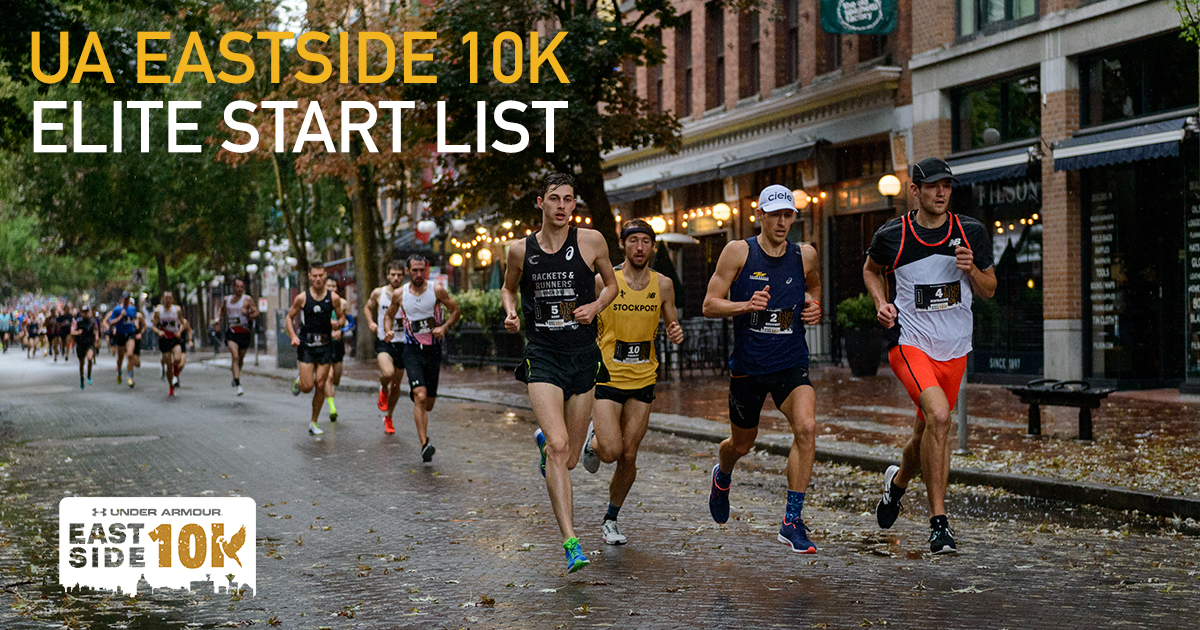
I don’t remember when I first learned who Ed Whitlock was, but I do know that for most of my growing up he held almost mythical status in my mind. As a young runner, hearing my dad—an avid marathoner himself—talk about Ed with great reverence forged an image of part-man, part-wing-footed spirit, gliding tirelessly for hours each day along serene cemetery roads, breaking this monotonous habit only to go off and capture world records. My interactions with other members of the Canadian running community over the years have lead me to believe that I was not alone in this impression.
When I finally met Ed in person and heard him speak at the 2016 Scotiabank Toronto Waterfront Marathon (STWM) elite athlete press conference, my perception of the man only grew more complicated. First off, he arrived in a suit and tie to contrast starkly with the jeans and athletic gear donned by every other runner.

At first glance he appeared almost stoic, standing expressionless off to one side of the room, not seeming particularly comfortable or pleased with the media buzz. But if his initial appearance was somewhat severe, everything changed when he obligingly engaged with the journalists and race organizers, his face softening into a kind smile whenever someone approached him. He was soft-spoken and deliberate, answering questions openly and without a hint of self-importance. When asked about his preparation for the marathon last fall, he mentioned an injury that had set him back, saying that that it was very frustrating not to have been able to put in as many 3-hour training runs as he would have liked, but that he supposed “this sort of thing happens as you get older.” He said that last part with a chuckle.
This juxtaposition of a publicly venerated legend with an almost comically dry and understated persona seemed consistent with Ed’s approach to being a runner more generally. By all accounts, he was austere and disciplined in his training, often saying that he didn’t particularly enjoy the rigours of hard running but was rather compelled to regiment by the desire to draw the best out of himself come race day. But he also strongly downplayed, or even flat-out dismissed, any reference to heroism or inspiration. This, despite countless world masters and age group records, including perhaps his most newsworthy accomplishments: Ed was the first, and remains the only septuagenarian to run under 3 hours for the marathon. He did this three times. 2:59:10 at STWM 2003; 2:54:49 at STWM 2004; and 2:58:40 at Rotterdam 2005.
My role as social media lead for the 2016 Scotiabank Toronto Waterfront Marathon included conducting post-race interviews for the live broadcast, granting me an all-access media pass to the finish line area. The top elites crossed the line to tremendous fanfare, cheered on my throngs of excited fans, media and agents. They conducted their interviews before being whisked away to Nathan Phillips Square for the awards presentation, the cameras and excitement following close behind.
With my on-camera responsibilities completed, I wandered back to the finish line to cheer on the masses and ride out the incredible energy of the morning. I approached the line just in time to hear the announcement that Ed Whitlock was less 1 kilometre away, and was on pace to annihilate the 85+ world record. Annihilate was a good word for it.
Ed bettered the previous record by over 30 minutes, dipping well under 4 hours in the process. Unlike the professional runners whose finish line experiences had been rife with pomp and ceremony, Ed sauntered into the chute accompanied by three fellow competitors (at least 40 years his junior) to the applause of a handful of dedicated fans. He stopped his watch, posed graciously for a few official photos, then asked if he could please have a cup of water. He demanded no attention, his signature grin acting as his only expression of celebration. But amongst those of us who were fortunate enough to bear witness to his feat, the atmosphere was palpable and the feeling was communal: deep respect. It is a memory that I am grateful for and will carry with me throughout my own running career.

Photo Credit: Kate Van Buskirk
Ed may not have seen himself as an inspiration, but he has been exactly that to me for as long as I’ve been a runner. His fortitude, his refusal to acknowledge age as a limiting factor, and his sheer love of running–whether based on compulsion or otherwise–all speak to me deeply and will continue to inspire me as long as I’m a runner (hopefully until I’m 86!)
A few moments later and with all signs of exertion eradicated, Ed spoke on camera with Canadian Running Magazine. He rested casually against the fence as if he were having an impromptu mid-day chat with a friend rather than having just completed a marathon faster than most people can dream of in their lifetimes. He spoke about having to be mentally tough and push through the hardest kilometres of the race when he wasn’t sure that he would be able to finish, something that runners of every level can relate to. And in my mind, that was the quiet heroism of Ed Whitlock: his humanity, his relateability, and his desire to be better at every age.







